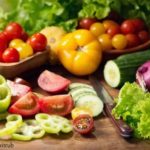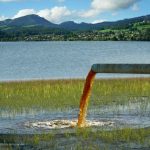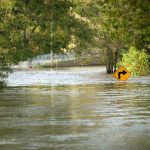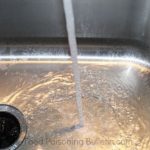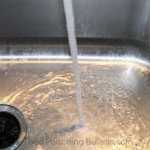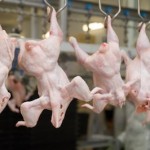Two groups focused on food safety are concerned about the government's decision to extend compliance dates for Produce Safety Rule agricultural water requirements in the Food Safety Modernization Act. The Center for Science in the Public Interest and Center for Food Safety are worried that delaying this enforcement would cause more than 700,000 cases in foodborne illness. The Produce Safety Rule is intended to make fresh fruits and vegetables safer to eat. Most food poisoning outbreaks are caused by these types of products. And one of the ways they can become contaminated is with animal feces in agricultural water runoff. The rule has provisions that require microbial testing of water for E. coli, a pathogenic bacteria that is often found in the feces of ruminant animals. This is … [Read more...]
Hawaii Restaurant Issued Cease and Desist Order
The Hawaii State Department of Health (DOH) Wastewater Branch has issued a Notice of Violation, Permit Suspension and Order to the Haleiwa Beach House Restaurant because its wastewater system is causing "an imminent threat to public health" by spilling wastewater onto a neighboring property used by children for educational purposes. Stuart Yamada, Environmental Management Division administrator said in a statement, "to protect public health and the environment and prevent the contamination of neighboring properties caused by the overloading of the restaurant's wastewater system, the department is ordering the Haleiwa Beach House to cease operation." The restaurant expanded without state and county approvals, so their system can't handle the expanded capacity of the … [Read more...]
Judge Dismisses Challenge on EPA Factory Farm Data
In Minneapolis yesterday, a federal judge dismissed a challenge brought by the American Farm Bureau Federation and the National Pork Producers Council against the EPA. Those groups wanted to block the EPA's ability to release public information about polluting factory farms to citizens and groups concerned about clean water. Food & Water Watch, Iowa Citizens for Community Improvement, and the Environmental Integrity Project, represented by lawyers at the Government Accountability Project, intervened on behalf of citizens. EPA released documents in 2013 about the location, size, and ownership of thousands of industrial factory farms that are a significant source of pollution to streams, rivers, and bays across the country. These farms are largely unregulated and hidden from people … [Read more...]
U.S. House Votes to Prevent Clean Water Act Expansion
The U.S. House voted on Monday to approve legislation that would prevent the development of regulations expanding the scope of the federal Clean Water Act. Groups such as the National Pork Producers Council supported this action, stating that the regulations would be detrimental to agriculture. The bill, HR 5078, entitled the "WOTUS Regulatory Overreach Protection Act" was sponsored by Rep. Steve Southerland (R-FL). WOTUS stands for Waters of the United States. The EPA wanted to expand the Clean Water Act to include the country's water bodies, ditches, and gullies used by farmers for drainage and irrigation. Many farmers support the bill, stating that the EPA's regulations are burdensome. The Clean Water Act is one of the most successful laws in this country. Forty years ago, 2/3 of … [Read more...]
Food & Water Watch States Toledo Water Crisis Only the Beginning
Food & Water Watch states that the crisis over Toledo's compromised water system is only the beginning in the United States. Earlier this month, levels of a toxin called microcystin prompted government officials to tell consumers not to use the water for drinking, cooking, bathing, or teeth brushing. That toxin is produced by a strong algal bloom. Over the weekend, the City was increasing monitoring and testing because they said "the testing level of untreated water at the direct intake is showing a strong presence of microcystin." The water was still considered safe to drink, since the water tested at .972; the World Health Organization has set a limit of 1.0 for that toxin. Chemicals brought the level of the toxin down to .456. Customers may have noticed a film on the water that … [Read more...]
Farm Crops Polluting Minnesota Waterways
Environmental Working Group has released a report called Broken Stream Banks that found pollution from farmland is a major problem in southern Minnesota, and wherever row crops are common in the U.S. the report states that this issue can be solved with the use of buffers, including grass strips, trees, and permanent vegetation. The report found that only 18% of perennial river and stream banks that are in agricultural areas are fully protected. Minnesota is a leader in fighting agricultural pollution with its Shoreland Management Act. That legislation places legal protection of "riparian" buffers between farmland and waterways. But the law is not being enforced across the state. There is a required 50-foot riparian buffer between farm land and waterways. EWG states that 170 waterways … [Read more...]
Focus of World Water Day 2014 is Energy
The focus of World Water Day 2014 is energy. The United Nations designated March 22, 1993 World Water Day and it has been observed annually since then as a day to focus attention on freshwater resources. Each year, a different aspect of freshwater management is highlighted. This year's focus is energy. Organizers hope this year's observance will raise awareness of the link between water and energy, contribute to the policy conversation in this area, and demonstrate how integrated approaches to these issues can achieve better results. "Particular attention will be paid to identifying best practices that can make a water- and energy-efficient 'Green Industry' a reality," according to the UN 's Water website. At least 780 million people throughout the world lack access to safe … [Read more...]
Food & Water Watch Targets Maryland Poultry Industry Polluters
Food & Water Watch is targeting poultry industries in Maryland that contribute to nutrient pollution in the Chesapeake Bay. Legislation introduced by Senator Richard Madaleno (D-18) and Delegate Shane Robinson (D-39), called the Poultry Fair Share Act, would hold Maryland's big poultry companies partially accountable for cleanup. Water quality in the Chesapeake Bay watershed has declined in recent years. Factory poultry farms on Maryland's Eastern Shore make a billion and a half pounds of waste every year. Contract growers are forced to dump excess chicken manure on saturated farm fields because these companies will not handle the waste themselves. Runoff ends up in the Bay and its tributaries. Food Poisoning Bulletin told you about this problem last month. Phosphorous pollution … [Read more...]
Formaldehyde Found In West Virginia’s Drinking Water
According to the Charleston Gazette, a Marshall University scientists and member of the state Environmental Quality Board said he found formaldehyde in local water samples linked to the Freedom Industries chemical spill three weeks ago. Formaldehyde is a carcinogen. This issue affects customers of West Virginia American Water. The first chemical found in the water, 4-methylcyclohexanemethanol, or also called Crude MCHM has methanol in it. Methanol breaks down into formaldehyde. The standard for Crude MCHM, according to the CDC, is 1 part per million, except for pregnant women. The CDC page on this issue states, "due to the limited availability of data, and out of an abundance of caution, pregnant women may wish to consider an alternative drinking water source until the chemical is at … [Read more...]
Mass Produced Meat Causing Phosphorous Pollution
NPR has a story on on mass production of meat in America is causing phosphorous pollution. The need for efficiency in food production is damaging the soil and water. Plants need phosphorous in order to grow. Most farmers used to get that mineral into their fields from animal waste. But then the inorganic fertilizer industry was developed, which separated animal production from crop production. Farmers started producing just one type of product, such as chickens, instead of producing chickens along with crops. And those animal factory farms produce tons of animal waste. That animal waste isn't used to fertilize crops anymore; it runs off or is just spread around the farm. When entire regions concentrate on producing chickens, for instance, there aren't many fields to absorb the … [Read more...]
